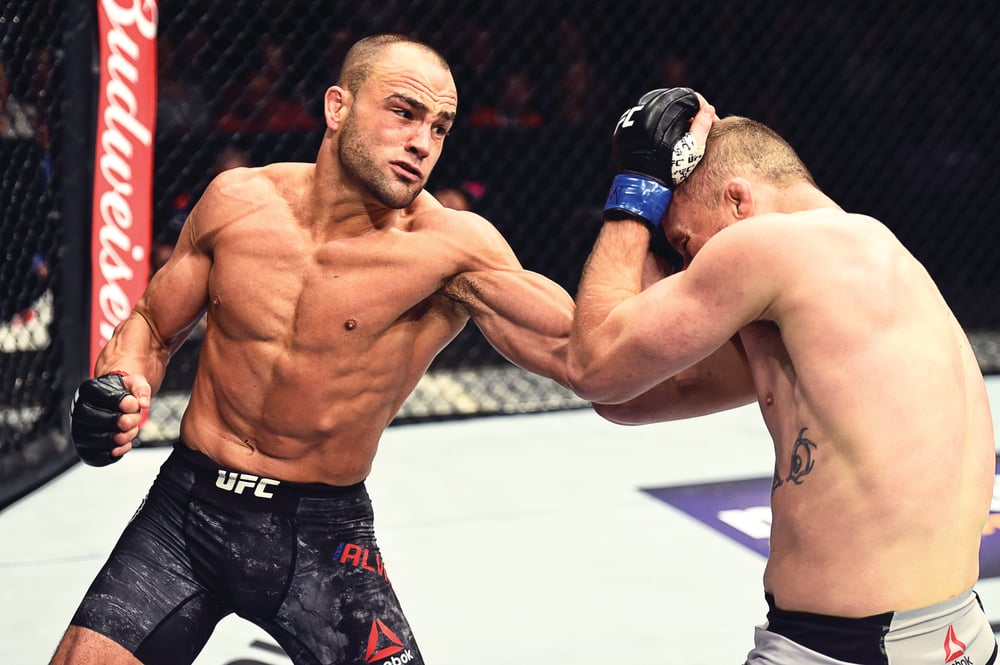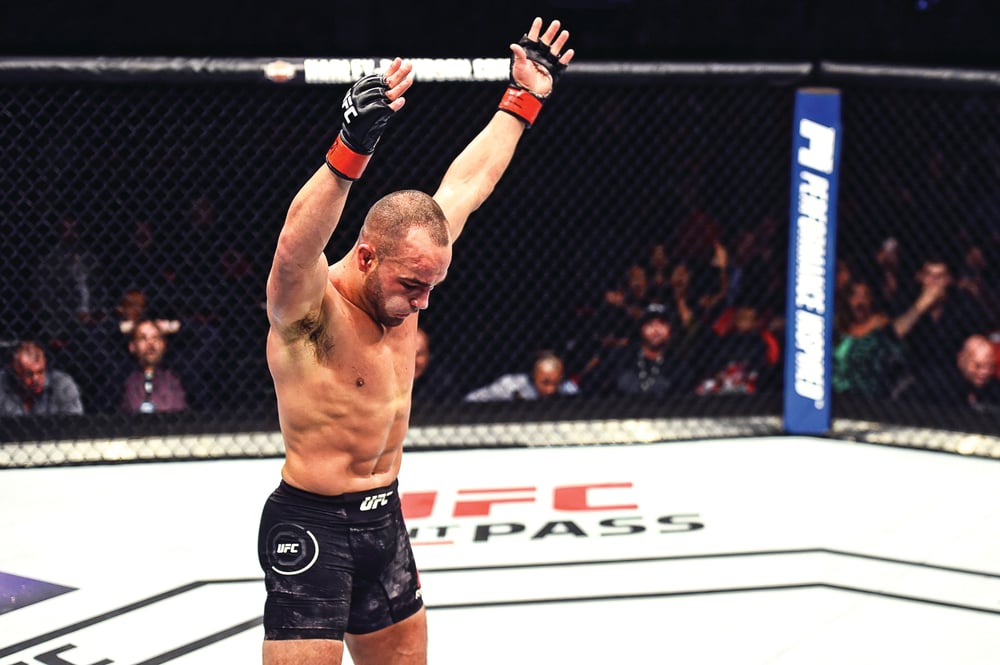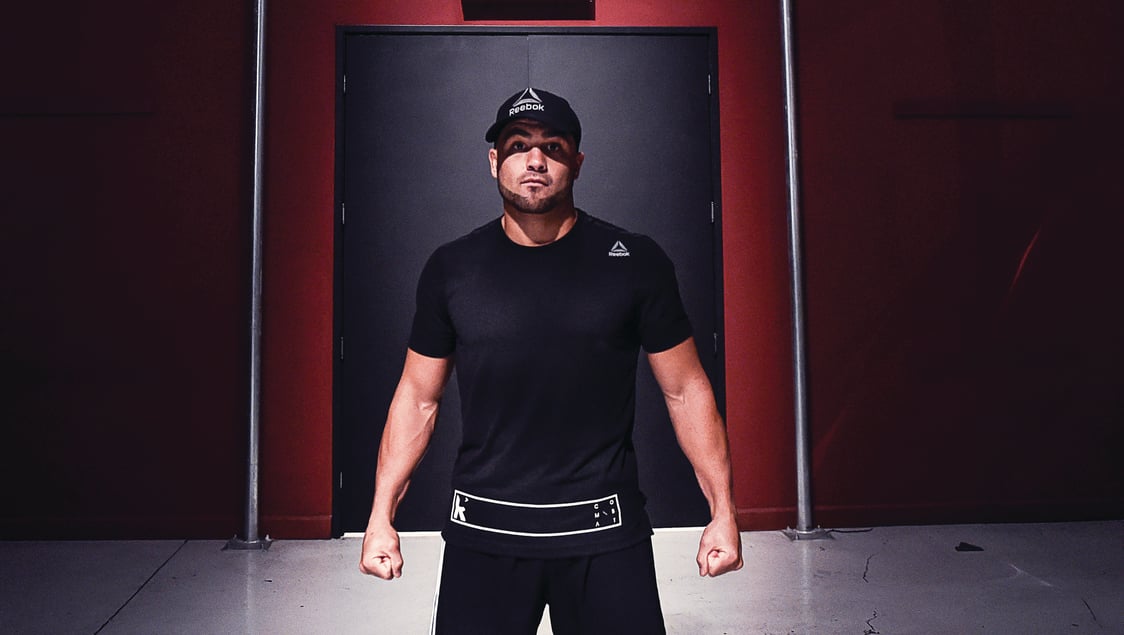
Issue 165
March 2018
How Eddie Alvarez rediscovered his intensity to claim the title of most violent man in MMA.
Until recently, it could be argued MMA fans hadn’t seen much of the real Eddie Alvarez in the UFC. The Philadelphian became a cult hero outside the Octagon thanks to some legendary wars, but aside from an adrenaline-pumping capture of the lightweight title from Rafael dos Anjos, he hadn’t regularly reached those heights.
When ‘The Underground King’ relinquished his belt with a whimper to Conor McGregor, some wondered if we’d ever see him capture that form again.
There was no need to worry. It took some soul-searching, but the former Bellator and UFC lightweight champion found a way to reinvigorate himself and rediscover the blue-collar approach to fighting that captured hearts and minds all those years ago.
“When I started in this sport and went 10-0, every single one of those fights ended by stoppage,” he says. “I had a lot of street fights before I ever fought in a cage, and I realized regardless of how the sport wants to paint it, it’s violence that people were attracted to and the more violent the fights were, the more people showed up. I wasn’t necessarily trying to be a bad guy or do a bad thing, I was just trying to keep a high pace in a violent way, and it meant more people came to the fights.”
He set out in search of a new title – one that doesn’t come with a gold strap, but is still highly valued by the thoroughbred fighters at the highest level of the sport. He wanted to be recognized as the most violent man in MMA.
By finding the right opponent in Justin Gaethje, and engaging in one of the most grueling battles of the year that left both men – and everyone watching breathless, the man from Kensington, Philadelphia, earned the label and completed his rehabilitation as an elite fighter in the sport’s most talent-rich division.
Relight the fire
To rediscover the form that made Edward Alvarez such a fan favorite, he first had to pick himself up. In December 2016, he suffered the most devastating loss of his career on the biggest stage there is – mugged by McGregor in Madison Square Garden.
A man known for his endurance and fighting spirit had been broken down and defeated. He had no answer for the speed and precision of ‘The Notorious’ and left the arena beltless with his head bowed. He’d suffered losses before, but never in such demoralizing fashion, in front of so many people and on such a big stage, too.
“To be quite honest, I was crushed by that whole moment,” he admits. “I think, more than anything, I know what I’m capable of and it’s moments like then... you have the opportunity to do something great and you work your whole life to present yourself with an opportunity to create a great moment and it was the total opposite of that. It was a disappointment and it took me a little bit of time to process that and find a bit of light.
“I’m a really positive person. I’ve been dealing with losses, wins and championships for my whole life, so I know eventually what I had to do to get over it. It’s just that moment in particular was a really hard pill to swallow.
“I understand what needs to be done to continue and at the end of the day, I love the sport. There are a ton of moments in my career that could have crushed me and would have crushed any normal person, but I love what I do and when you love something you’re able to deal with the bad shit, the good shit and everything involved."
Five months later at UFC 211, he was back at it, though it took a few moments to get up to speed with Dustin Poirier. 'The Diamond' had the better of the opening round, then stunned Alvarez in the second.
The Philly faithful would be forgiven for fearing the worst as their man stumbled back into the fence, but they would have done well to remember this used to be nothing out of the ordinary.
The 'old' Alverez was back seconds later. Collecting himself and finding his feet under heavy fire, he rolled with the punches to land a flush left hook. The fight was turned on its head, and the crowd in Texas' American Airlines Center went crazy.
Sadly, the contest didn't go much further, as an Alvarez knee thrown in the heat of battle brought an unmitigated barnburner to an unceremonious halt. But Alvarez had shown the re was burning again. A rematch was proposed, but the UFC announced Alvarez was instead recruited to coach opposite Gaethje on the 26th season of The Ultimate Fighter instead.

The Poirier battle was great fun, but the result was almost forgotten as MMA mouths around the world began to water in anticipation of a feast of violence that would follow.
Bring the pain Gaethje was coming off a gob-smacking war against Michael Johnson at the TUF 25 Finale and presented himself as the antidote to other top lightweights who spent more time arguing about who should fight whom, instead of actually fighting. He also claimed to be the most violent man around.
Alvarez’s interest was piqued. He didn’t ask to face him, but when that was proposed, it stirred something inside him – something that had been missing.
“They came to me with the Gaethje fight,” he says. “I’d always watched Justin’s fights. As I got a little older in the sport and a lot more experienced, I kind of let go of the part of myself that was so carefree, reckless, and risk-taking and I became a little bit more conservative. The more we did that show together, and the more I watched his lm, the more I wanted to bring out that side.
“That’s the kind of picture I wanted to paint in that fight with him – my old self. I didn’t want to be the conservative guy – I wanted to be more like Justin! That’s when people enjoyed my fights the most and that’s when I enjoyed fighting the most, so I looked at Justin for a way to bring that out of me. I pegged it as deciding who would be the sport’s most violent man, because look at what Justin’s done, and the manner he does it – it’s why people love Justin Gaethje.
“I admire him. In a sense, I wanted to adopt that thought pattern again where I’d just go in and I didn’t think so much. I was a bit reckless, a bit risk-averse.
I wanted it to be like that again. It felt good when I was younger and I came into the sport to be like that. Over time and with experience, a lot of bad things happen: you can get knocked out – which causes you to kind of freeze and not take as many risks. I think it makes the sport less fun and it makes you more fearful.
I didn’t want to feel fearful and I wanted to enjoy the sport again, and that was the solution.”
The former World Series of Fighting champion was the kind of man who would make Alvarez wake up early and go to bed late as he was training. He’d need to build, prepare to dig deep, get into the thick of it, and let his hands fly without fear when they faced off. It was a potentially career-defining fight, despite lacking an ‘official’ title on the line.
But there still needed to be a plan. Walking into the Gaethje blender with reckless abandon is practically guaranteed to result in a concussion. Michael Johnson found out the hard way when he tried to fight re with re. Luckily, Alvarez was backed by “genius” coach Mark Henry, who he says creates championship-winning “recipes” for his fighters to follow.
He just needed to add a pinch of his own flavor.
“That works for a lot of guys and it worked for me. He’s a big part of why I won the world title. But that’s not the kind of fighter I am. I’m not a copy-and-paste type of guy. I need to have some creative freedom. I’m the reckless type and he brings me down to Earth. I need a guy like that so I don’t get knocked out every single fight. I asked him for a little more creative freedom so I can just enjoy myself inside the Octagon a bit more, and he allowed it to a certain degree. I think we found the perfect balance.
“Sometimes when you learn too much it becomes a bit too robotic. I like the imperfection.”
The 13:59 of mayhem that took place in the Octagon at UFC 218 was the result of that approach. Within a minute of Herb Dean starting the fight, chaos ensued. Neither man gave any quarter. Every strike was thrown with bad intentions and every exchange resulted in damage. Anyone watching who wasn’t on the edge
of their seat was out of it. Alvarez was visibly hurt by leg kicks that forced him to switch stances but, in an act of pure aggression, he’d just switch back and rip vicious shots to the body in reply. His face swelled badly, but he still walked into the line of fire to punish his foe with everything he had. He was sitting in the pocket and exchanging vicious strikes, thriving in the throes of violence.
He was relaxed, creative, playing, and having fun – despite the trauma both men were going through suggesting he should be doing anything but.
“For the first time in a long time, I wasn’t in any thought in a fight. I remember it being like that when I was younger,” says the 34-year-old. “You could have asked me how the fight went and I wouldn’t know, I’d have had to watch it and see. I was just reacting. There were certain points in that fight when I thought I was completely present and being instinctual. I was just in the zone. When that happens, I start enjoying myself, talking to my opponent, things start to happen that I remember happening when I was younger, which means I’m in an enjoyable part of the fight.”
He was also doing something no one had managed before, by beating Gaetjhe for stamina. He kept eating low kicks, but they fueled his forward momentum as his opponent started to fade. When he was able to grab a collar tie, he still had the repower for a perfectly-placed knee to the jaw.
It was finally over, and the most violent man in MMA was now undeniably Eddie Alvarez.

Glutton for punishment
How do you follow a fight like that? Given the way his reputation was enhanced even further, and the amount of respect the Alvarez name carries, the simple answer is to bring his brand of intensity to one of the few lightweights who have a comparable status at 155lb.
Generation gap
If anyone’s fights deserve repeat viewings, it’s Alvarez’s – going right back to
the start of his career, through his run in Japan, the time he spent in Bellator and his UFC efforts. The man himself shares that view.
“Oh, absolutely, I’m the biggest Eddie Alvarez fan there is!” he says. “The (Tatsuya) Kawajiri and (Joachim) Hansen fights, I was still raw and going against guys who’d been in the sport so long – just going o pure street fighting.”
Few back catalogs contain as many instant classics that he’ll be able to show his children as they grow older. For now, however, they’re not so interested “It’s more me and my wife,” he says. “The kids, I’ve been fighting their whole lives so it’s not a huge deal. I’m just the guy that’s been fighting. As long as we go to Disney World, I don’t think they really care!”
“Any of the guys in front of me,” he states, emphatically. “Right now, it’s Khabib (Nurmagomedov) and Tony (Ferguson) in front of me and that’s who I’ve got my eye on. If they’re tied up, I’d love to do a mega fight with Nate Diaz.”
This wishlist consists of the only two fighters ranked higher (taking the absent McGregor out of the equation), or one with huge commercial appeal, as well as a little bad blood dating back to a hostile encounter in Mexico City in 2015.
But perhaps a more pressing question is why Alvarez would follow a fight like that. Why would he put his body and his family through yet another traumatic experience? Why would he go through the punishing training it takes to step into the cage, then absorb ungodly amounts of physical abuse?
“The sport is about continuing to grow – and not just as a fighter, as a human being, a father and a husband,” Alvarez says. “I’ve become a better person because this sport has taught me to become more resilient. The more I challenge myself, the more I grow and this sport has given me a ton of challenges from every angle.”
“A lot of people ask that, and if I’m still competitive I can’t allow my mind to drift that way. It wouldn’t be good to let my mind drift any other way than becoming world champion again.
“I don’t have to fight, I don’t. I look at fighting as an opportunity now. I don’t have to work a nine-to-five job, I don’t have a schedule, I have freedom, I get to do what
I love and get paid a big old sum of money afterwards.
“I want to take advantage of this opportunity for as long as I can and in the meantime, I’m going to be completely honest with myself about how I can perform against the best guys in the world... I’m not a bull s**tter... I can compete at a high level and as long as I can do that, I’ll be in this sport.”
As long as he competes and continues to win, he’ll also enhance his case for being the greatest lightweight the sport has ever seen. For more than a decade, it’s been MMA’s most talent-rich division, but no man has had a sustained period of dominance to really stand alone like Georges St-Pierre at 170lb or Jose? Aldo at 145.
But with wins over Gaethje, Anthony Pettis, Gilbert Melendez, Shinya Aoki, Michael Chandler, and Rafael dos Anjos – champions in WSOF, WEC, Strikeforce, Dream, and the UFC – he has a strong case.
Alvarez is humble about whether his achievements are worthy of the status of ‘greatest’ at 155. “They’re some big shoes to fill... but that’d be great. That’s a goal. By the time I’m done, we’ll be able to talk about whether my job was well done. Right now, I feel like I have still got more work to do, but I’ve held every title there is and I’m proud of it.”
He may well win the popular vote. He adds, if he can beat those ranked above him and reclaim the UFC title, then he’ll be able to answer with more certainty.
“By the time I’m done, there shouldn’t be a doubt as far as my resume, accomplishments, and people I’ve fought are concerned. I’d like to be considered the greatest.”
Until then, Eddie Alvarez is happy to be crowned the most violent man in MMA. Long may he reign.
...









